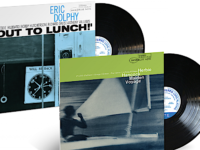by Nick DeRiso
“Elegy” begins with a trill from Herbie Hancock, then a persistent, oh-so distinctive tapping that could only be drummer Tony Williams. Next, a nimble, casually funky bass line from Ron Carter.
Like a dream made real, Miles Davis’ second great group — with Wallace Roney stepping in for the fallen trumpeter — steps out of the shadows to pay tribute to Davis on 1994’s “A Tribute to Miles” on Qwest.
Still ahead is a quietly insinuating signature from saxophonist Wayne Shorter and (in a mirage-like turn) Roney, the apprentice who travelled with Miles late in his career.
Hancock did a series of limited engagements with this band in the wake of Davis’ 1991 death, then issued this emotional tribute as part of his 38th album three years later — winning a third Grammy along the way. The album also included two tunes from the tour.
As much as the record is about Miles, though, this song is about Hancock. His is the first sound you hear, strolling and then walking fast. Later, Hancock moves inside and outside of Shorter and Roney’s romantically insistent chorus.
The quiet determination of Hancock (who dabbled in more mainstream pop sounds with and without Davis, but keeps things firmly in the pocket here) is what moves this song — and the whole CD, really — from the expected meloncholy and into a memorable celebration of cool.
We find in this “Elegy” not just the expected sorrow of loss, but also the knee-slapping joy of reunion — and a perhaps not-so surprising need to return to the comforts of convention, of more familiar keyboard jazz, of home.
For all of Hancock’s popular forays into post-bop and radio-accessible, synth-driven funk music, he retains his early gift for the melodic joys of straight-ahead playing. (After all, this is a guy who, as an 11-year-old, initially performed Mozart’s Piano Concerto No. 5 with the Chicago Symphony.)
And so the familiar labyrinth of rhythm so closely associated with Hancock when he played for Davis in the 1960s along side Williams (who himself died unexpectedly from a heart attack in 1997) and Carter, gives way to something so simple and yet so perfect that it becomes instantly timeless.
- Nick DeRiso’s Best of 2015 (Rock + Pop): Death Cab for Cutie, Joe Jackson, Toto + Others - January 18, 2016
- Nick DeRiso’s Best of 2015 (Blues, Jazz + R&B): Boz Scaggs, Gavin Harrison, Alabama Shakes - January 10, 2016
- Nick DeRiso’s Best of 2015 (Reissues + Live): John Oates, Led Zeppelin, Yes, Faces + others - January 7, 2016




